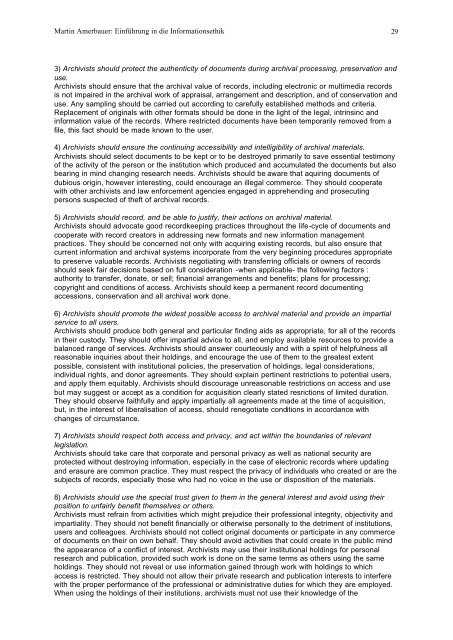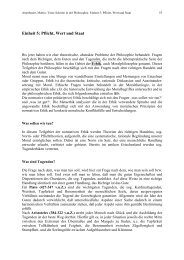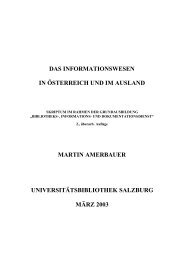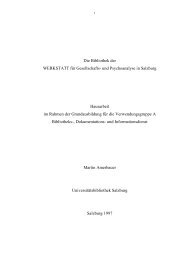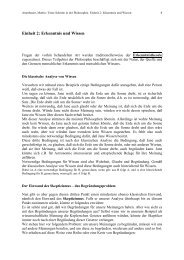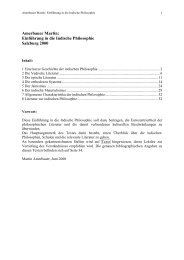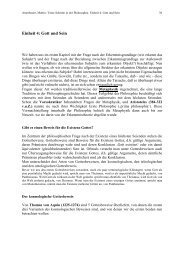EINFÜHRUNG IN DIE INFORMATIONSETHIK ... - Amerbauer Martin
EINFÜHRUNG IN DIE INFORMATIONSETHIK ... - Amerbauer Martin
EINFÜHRUNG IN DIE INFORMATIONSETHIK ... - Amerbauer Martin
Sie wollen auch ein ePaper? Erhöhen Sie die Reichweite Ihrer Titel.
YUMPU macht aus Druck-PDFs automatisch weboptimierte ePaper, die Google liebt.
<strong>Martin</strong> <strong>Amerbauer</strong>: Einführung in die Informationsethik 29<br />
3) Archivists should protect the authenticity of documents during archival processing, preservation and<br />
use.<br />
Archivists should ensure that the archival value of records, including electronic or multimedia records<br />
is not impaired in the archival work of appraisal, arrangement and description, and of conservation and<br />
use. Any sampling should be carried out according to carefully established methods and criteria.<br />
Replacement of originals with other formats should be done in the light of the legal, intrinsinc and<br />
information value of the records. Where restricted documents have been temporarily removed from a<br />
file, this fact should be made known to the user.<br />
4) Archivists should ensure the continuing accessibility and intelligibility of archival materials.<br />
Archivists should select documents to be kept or to be destroyed primarily to save essential testimony<br />
of the activity of the person or the institution which produced and accumulated the documents but also<br />
bearing in mind changing research needs. Archivists should be aware that aquiring documents of<br />
dubious origin, however interesting, could encourage an illegal commerce. They should cooperate<br />
with other archivists and law enforcement agencies engaged in apprehending and prosecuting<br />
persons suspected of theft of archival records.<br />
5) Archivists should record, and be able to justify, their actions on archival material.<br />
Archivists should advocate good recordkeeping practices throughout the life-cycle of documents and<br />
cooperate with record creators in addressing new formats and new information management<br />
practices. They should be concerned not only with acquiring existing records, but also ensure that<br />
current information and archival systems incorporate from the very beginning procedures appropriate<br />
to preserve valuable records. Archivists negotiating with transferring officials or owners of records<br />
should seek fair decisions based on full consideration -when applicable- the following factors :<br />
authority to transfer, donate, or sell; financial arrangements and benefits; plans for processing;<br />
copyright and conditions of access. Archivists should keep a permanent record documenting<br />
accessions, conservation and all archival work done.<br />
6) Archivists should promote the widest possible access to archival material and provide an impartial<br />
service to all users.<br />
Archivists should produce both general and particular finding aids as appropriate, for all of the records<br />
in their custody. They should offer impartial advice to all, and employ available resources to provide a<br />
balanced range of services. Archivists should answer courteously and with a spirit of helpfulness all<br />
reasonable inquiries about their holdings, and encourage the use of them to the greatest extent<br />
possible, consistent with institutional policies, the preservation of holdings, legal considerations,<br />
individual rights, and donor agreements. They should explain pertinent restrictions to potential users,<br />
and apply them equitably. Archivists should discourage unreasonable restrictions on access and use<br />
but may suggest or accept as a condition for acquisition clearly stated resrictions of limited duration.<br />
They should observe faithfully and apply impartially all agreements made at the time of acquisition,<br />
but, in the interest of liberalisation of access, should renegotiate conditions in accordance with<br />
changes of circumstance.<br />
7) Archivists should respect both access and privacy, and act within the boundaries of relevant<br />
legislation.<br />
Archivists should take care that corporate and personal privacy as well as national security are<br />
protected without destroying information, especially in the case of electronic records where updating<br />
and erasure are common practice. They must respect the privacy of individuals who created or are the<br />
subjects of records, especially those who had no voice in the use or disposition of the materials.<br />
8) Archivists should use the special trust given to them in the general interest and avoid using their<br />
position to unfairly benefit themselves or others.<br />
Archivists must refrain from activities which might prejudice their professional integrity, objectivity and<br />
impartiality. They should not benefit financially or otherwise personally to the detriment of institutions,<br />
users and colleagues. Archivists should not collect original documents or participate in any commerce<br />
of documents on their on own behalf. They should avoid activities that could create in the public mind<br />
the appearance of a conflict of interest. Archivists may use their institutional holdings for personal<br />
research and publication, provided such work is done on the same terms as others using the same<br />
holdings. They should not reveal or use information gained through work with holdings to which<br />
access is restricted. They should not allow their private research and publication interests to interfere<br />
with the proper performance of the professional or administrative duties for which they are employed.<br />
When using the holdings of their institutions, archivists must not use their knowledge of the


